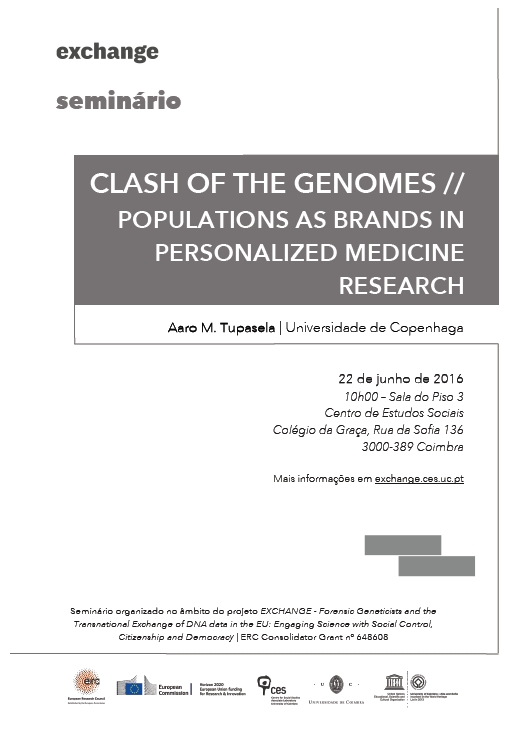Seminar
Clash of the Genomes – Populations as Brands in Personalised Medicine Research
Aaro Tupasela (University of Copenhagen)
June 22, 2016, 10h00
Room at 3rd Floor, CES-Coimbra | Graça
Abstract
During the past five years a number of national and regional initiatives have been launched in the hopes of supporting the development of personalised health care research through the collection and analysis of large numbers of genomes from populations. Larger projects, such as the Genomics England Initiative, as well as the launch of the US Precision Medicine Initiative are paralleled by smaller national and regional initiatives within countries like Denmark, Estonia, Faroe Islands and Finland to collect large numbers of samples from the population, sequence them and then leverage them for biomedical research.
Sociologically, studies of the biomedical collection and use of human tissue sample collections have developed into its own distinct rubric under both the sociology of science and technology studies (STS) and medical sociology as well, which have sought to examine the different ways in which bodies are being commodified and sourced (Schepher-Hughes and Wacquant 2002) in what Waldby (2002) has termed tissue economies. These approaches have provided important extensions to studies of gifts as a central component of exchange (Mauss 2004), materialist analysis of production and capital accumulation (see Sunder Rajan 2006; Marx 1977), as well as providing new insights into the motivations and concerns of donors in participating in research.
In this talk I will consider three broader interrelated developments which I see as important in this development. First, I will look at how various actors (researchers and policy-makers) are seeking to lay claim over genetic resources through the generation of different forms of authenticity and origin (Tupasela and Tamminen, 2015; Tamminen, 2010). Second, I will discuss the ways in which populations are increasingly becoming forms of brands in which particular characteristics are associated with them for the purposes of differentiating them from others (Tupasela, 2016a; 2016b; Tupasela, et al., 2015). Third, I will discuss, (a somewhat interrelated issue) how different countries exercise policies of inclusion (and exclusion) in an attempt to define group identity. I see these two movements as intertwining a particular form of national scientific identity politics with national innovation policies related to biomedical research. Although these developments will offer new possibilities and hopes for the development of diagnostics, treatments and therapies, there also emerges, I argue, a new type of tension in which populations and the genetic characteristics they are ascribed, become a new type of scientific battle ground. Extending Paul Rabinow’s (1999: 105) discussion on the ways in which the state stands between the ‘market’ and the dignity of the human person, I seek to argue that states are positioning their populations in new ways in relation to biomedical research markets. Within this context nations and regions will seek to have their own ‘national’ genomes, which they will use to leverage themselves onto international research markets.
Bio
Aaro Tupasela, Section for Health Services Research, Department of Public Health, University of Copenhagen. Aaro's research interests focus on social, ethical and legal aspects of biobanking and the biomedical use of human tissue collections. I am currently invovled in the Global genes, local concerns project which examines notions of rights and duties related to internatinal collection and use of tissue samples. In particular I am focussing on formal and informal network dynamics and formation in relation to the biomedical use of tissue and data.
Activity within the research project EXCHANGE - Forensic Geneticists and the Transnational Exchange of DNA data in the EU: Engaging Science with Social Control, Citizenship and Democracy


